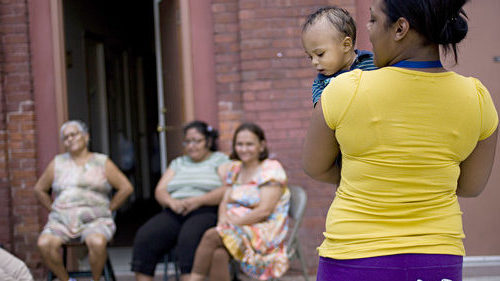Our New Grantmaking Strategy for Equitable Results

Focusing on the People Most Impacted by Homelessness and Housing Instability
2021 was a year of transition, reimagining and growth for the Melville Trust. In addition to grantmaking, staff were busy with significant behind the scenes work, including the creation of a new strategy that is rooted in racial equity.
This is a natural evolution of our work and is based on what we have learned about homelessness over the years, along with current realities including diminishing numbers of available and affordable rental units, sky-high rents, low-paying jobs and growing numbers of people who have lost their homes.
While we will continue to focus on policy and systems change, we also recognize the need to focus more intentionally on the people most impacted, and the conditions that cause them to lose their housing in the first place.
What the data tell us
We began this our strategic review by looking at data, which clearly show that Black, Indigenous and Latino/a/x Americans experience much higher rates of homelessness than white Americans. Black LQBTQ+ youth and young adults face homelessness two times as much as their White LGBTQ+ peers. And Black and Latino/a/x households are far more likely to be cost-burdened, spending more than 30% of their income on housing.
Our data analysis, conversations with stakeholders and imagination sessions helped us recognize that we will never end homelessness if we do not concentrate our efforts on the populations that bear the greatest burden, specifically Black and Latino men; Black and Latina single mothers and Black, Latinx and LQBTQ+ youth and young adults.
Understanding which populations are most impacted helped us think through the root causes that perpetuate housing instability among these communities, and which of many complex issues we could address, given our size and capacity. Basing our work on the theory of aligned contributions, the Trust’s focus will address the following root causes:
● Lack of rapid pathways to decent, permanent housing for people experiencing and at risk of homelessness;
● Insufficient income and assets that create housing instability and expand the racial wealth gap;
● Racist housing, zoning and land use policies that perpetuate housing instability and homelessness.
Our grantmaking will use the following strategies to address these root causes:
● Supporting anti-racist policy change;
● Building and shifting power of People of Color with lived experience of homelessness and housing instability;
● Shifting public and political will.
Reflecting on new work
With our new strategy in place, the Trust’s grantmaking staff offered some reflections about their work, and what excites them most.
Aimee Hendrigan, Executive Vice President
The Trust’s clear focus on ending homelessness and housing instability for Black, Indigenous and Latino/a/x populations requires us to look at our work through an equity lens, and allows us to engage with partners in new ways. In addition to these new opportunities, I continue to be inspired by our work supporting the leadership of youth and young adults with lived experience and I am excited that we are funding new youth-driven approaches like direct cash payment (read more about that in a recent Newsweek article).
Alyia Gaskins, Senior Program Officer
Land use decisions determine how much, where and what type of housing is built in communities. Increasing the supply of affordable housing is critical to ensuring that people do not become homeless in the first place. I am excited about this new body of work and eager to learn how land use decisions impact housing and homelessness; what types of policies are needed to advance a new land use policy agenda; and what it would take to democratize development decisions to design housing and places where Black, Indigenous and Latino/a/x people matter and thrive.
Rebecca Allen, Senior Program Officer
I am happy that we will be applying some of what we’ve learned in our youth work to adult populations, especially on issues like direct cash assistance (Guaranteed Basic Income) and organizing (eviction prevention, tenant ownership). In addition, the Trust is exploring participatory grantmaking, which is a wonderful new direction for us and speaks to our focus on building and shifting power.
Sarah Armour-Jones, Director of Communications and Media Strategy
The Trust is supporting a range of great media and narrative change efforts, including the Housing Narrative Lab, journalism and storytelling that elevate the perspectives of people with lived experience of homelessness and housing instability. I am passionate about this work, and I feel especially grateful that one of our core strategies is ‘shifting public and political will,’ which has the potential to make a significant impact on public perception, laying the groundwork for lasting policy change.
As we explore these areas of grantmaking we know we will learn a lot and need to incorporate new ideas into our efforts. This is hard and humbling work, and it requires a commitment to learning, evaluation and re-alignment. We expect to stumble, but we hope that by focusing on the populations most impacted, and the systems that cause homelessness and housing instability, we will move that much closer to our goal – that all Black, Indigenous and Latino/a/x people with extremely low incomes have a safe, affordable home in a community that allows them to thrive.
You can keep up to date with our work and see how we’re doing by signing up for our newsletter below.
